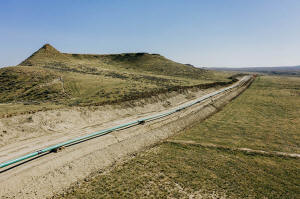Montana to ask state top court to overturn landmark climate ruling
 Send a link to a friend
Send a link to a friend
 [July 10, 2024]
By Nate Raymond [July 10, 2024]
By Nate Raymond
(Reuters) - Montana's top court is set to hear the state's appeal of a
landmark ruling holding that it was violating the rights of young people
to a clean and healthful environment by barring regulators from
considering the impacts on climate change when approving fossil fuel
projects.
The Republican-led state will urge the Montana Supreme Court to conclude
that the lawsuit by 16 young people should never have gone to trial in
the first place because they lack legal standing to challenge a
restriction on agencies' ability to consider the impact of greenhouse
gas emissions.
The state is asking the court to reverse an August 2023 ruling by
District Court Judge Kathy Seeley in Helena in the closely watched case.
It was the first lawsuit in the United States by young environmental
activists challenging state and federal policies they say are
exacerbating climate change to go to trial.
The youth-led lawsuits have taken aim at government policies at the
state and federal level that they say encourage or allow the extraction
and burning of fossil fuels and violate their rights under U.S. or state
constitutions.

While some of those cases have faltered, the youth activists last month
scored a major victory when the state of Hawaii agreed as part of a
first-in-the-nation settlement to take action to decarbonize its
transportation system by 2045.
The 16 Montana plaintiffs sued in 2020, when they were ages 2 to 18,
alleging the state's fossil fuel-based energy system and permitting of
projects like coal and natural gas production exacerbated green house
gas emissions and climate change.
Through lawyers at the non-profit law firm Our Children's Trust, the
plaintiffs have argued that a state law that barred Montana officials
from considering the impacts of climate change when conducting
environmental reviews of proposed projects violated their rights under
Montana's state constitution.
Seeley agreed, saying the young people had a fundamental constitutional
right to a clean and healthful environment under a 1972 amendment to
Montana's constitution requiring the state to protect and improve the
environment.
[to top of second column]
|

An extension of Denbury Inc's Greencore carbon pipeline is ready to
be lowered into its trench, in Montana, U.S., 2021. Denbury/Handout
via REUTERS/File Photo

She said the state's failure to consider greenhouse gas emissions
and climate change had harmed the young people's mental and physical
health as well as their recreational interests, cultural traditions,
economic security and happiness.
"The evidence we put on trial shows how greenhouse gas emissions
both within a state, regionally and globally are injuring citizens,
particularly our youngest citizens and future generations," said
Phil Gregory, a lawyer for the plaintiffs.
Chase Scheuer, a spokesperson for Republican Montana Attorney
General Austin Knudsen, said Seeley should have tossed the case from
the outset instead of giving the plaintiffs a "show trial" that he
called a "taxpayer-funded publicity stunt."
The state in a brief said Seeley should have concluded the young
people had failed to establish they had legal standing to challenge
the law because a single Montana statute could not be the cause of
their alleged injuries since to curb climate change the world's
energy system would have to be transformed.
The plaintiffs' lawyers counter that they had suffered concrete
harms as a result of Montana's unfettered permitting of fossil fuel
projects, which they say have caused an increase in greenhouse gas
emissions and have degraded Montana's environment.
(Reporting by Nate Raymond in Boston, Editing by Alexia Garamfalvi
and Sandra Maler)
[© 2024 Thomson Reuters. All rights reserved.]This material
may not be published, broadcast, rewritten or redistributed.
Thompson Reuters is solely responsible for this content.
 |